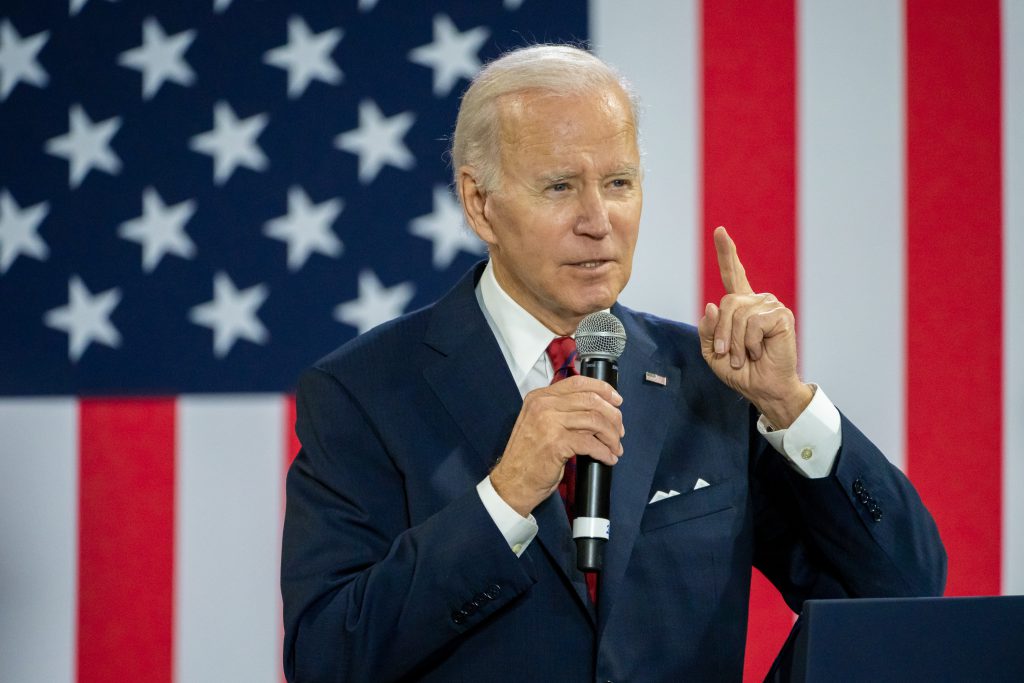Indianz.Com > COVID-19 > White House Office of Management and Budget (Joe Biden Administration)
Posted: January 30, 2023

President Joe Biden delivers remarks on the economy in Springfield, Virginia, on January 26, 2023. Photo by Hannah Foslien / White House
White House Office of Management and Budget
January 30, 2023
(House Rules)
(House Rules)
STATEMENT OF ADMINISTRATION POLICY
H.R. 497 – A bill to eliminate the COVID-19 vaccine mandate on health care providers furnishing items and services under certain Federal health care programs
(Rep. Duncan, R-SC, and 67 cosponsors)
Protecting vulnerable patients across the country from the devastating effects of COVID-19 remains a top priority for the Administration. Therefore, the Administration strongly opposes the Freedom for Health Care Workers Act, which would expose patients to unnecessary risk.
The Administration’s requirement that health care facilities that participate in Medicare or Medicaid establish policies and procedures to ensure covered staff are vaccinated against COVID-19 protects the lives of patients, along with the health care workers that provide them care, at 76,000 medical facilities nationwide. Ensuring patient safety and quality of care is a critical responsibility of the Centers for Medicare & Medicaid Services, and COVID-19 vaccination requirements for health care workers are key to combatting the evolving circumstances of COVID-19. As the Supreme Court said with respect to this rule, “[E]nsuring that providers take steps to avoid transmitting a dangerous virus to their patients is consistent with the fundamental principle of the medical profession: first, do no harm.”
Vaccines remain one of our strongest tools to fight against COVID-19 and protect individuals from serious illness, hospitalization, and death. Health care workers may work on a daily basis with vulnerable populations, and the virus in health care settings continues to pose a significant risk to health care workers and their patients. Health care staff being unable to work because of COVID-19 further strains the health care system and limits patients’ access to safe and essential care.
While COVID-19 is no longer the disruptive threat that it once was, it makes no sense for Congress to reverse this protection for vulnerable patients, as well as our health care workers who have given so much to protect us. A vote for this bill threatens the lives of patients and health care workers alike.
If Congress were to pass H.R. 497, the President would veto it.
The Administration’s requirement that health care facilities that participate in Medicare or Medicaid establish policies and procedures to ensure covered staff are vaccinated against COVID-19 protects the lives of patients, along with the health care workers that provide them care, at 76,000 medical facilities nationwide. Ensuring patient safety and quality of care is a critical responsibility of the Centers for Medicare & Medicaid Services, and COVID-19 vaccination requirements for health care workers are key to combatting the evolving circumstances of COVID-19. As the Supreme Court said with respect to this rule, “[E]nsuring that providers take steps to avoid transmitting a dangerous virus to their patients is consistent with the fundamental principle of the medical profession: first, do no harm.”
Vaccines remain one of our strongest tools to fight against COVID-19 and protect individuals from serious illness, hospitalization, and death. Health care workers may work on a daily basis with vulnerable populations, and the virus in health care settings continues to pose a significant risk to health care workers and their patients. Health care staff being unable to work because of COVID-19 further strains the health care system and limits patients’ access to safe and essential care.
While COVID-19 is no longer the disruptive threat that it once was, it makes no sense for Congress to reverse this protection for vulnerable patients, as well as our health care workers who have given so much to protect us. A vote for this bill threatens the lives of patients and health care workers alike.
If Congress were to pass H.R. 497, the President would veto it.
* * * * * * *
This statement is online here: https://www.whitehouse.gov/wp-content/uploads/2023/01/SAP-H.R.-497.pdf
Join the Conversation
Search
Advertisement
Filed Under
Tags
More in COVID-19
NCUIH Applauds the Invitation of Native Health Leaders at Joint Session of Congress
Tuba City Regional Health Care Corporation (Navajo Nation)
HHS Small Ambulatory Program Awards $55 Million to 15 Tribes and Tribal Organizations (Indian Health Service)
Indian Health Service Announces New Deputy Director for Quality Health Care and Enterprise Risk Management (Indian Health Service)
Federal Emergency Management Agency (FEMA)
White House Office of Management and Budget (Joe Biden Administration)
Tuba City Regional Health Care Corporation (Arizona, Navajo Nation)
Oklahoma City Indian Clinic (OKCIC)
Indian Health Service (Department of Health and Human Services)
Navajo Nation Town Hall (Arizona, New Mexico, Utah)
Navajo Nation (Arizona, New Mexico, Utah)
Tribal organizations statement on advance appropriations for Indian Health Service
Indian Health Service Statement on Advance Appropriations (Department of Health and Human Services)
Indian Health Service (Department of Health and Human Services)
Indian Health Service (Department of Health and Human Services)
Tuba City Regional Health Care Corporation (Navajo Nation)
HHS Small Ambulatory Program Awards $55 Million to 15 Tribes and Tribal Organizations (Indian Health Service)
Indian Health Service Announces New Deputy Director for Quality Health Care and Enterprise Risk Management (Indian Health Service)
Federal Emergency Management Agency (FEMA)
White House Office of Management and Budget (Joe Biden Administration)
Tuba City Regional Health Care Corporation (Arizona, Navajo Nation)
Oklahoma City Indian Clinic (OKCIC)
Indian Health Service (Department of Health and Human Services)
Navajo Nation Town Hall (Arizona, New Mexico, Utah)
Navajo Nation (Arizona, New Mexico, Utah)
Tribal organizations statement on advance appropriations for Indian Health Service
Indian Health Service Statement on Advance Appropriations (Department of Health and Human Services)
Indian Health Service (Department of Health and Human Services)
Indian Health Service (Department of Health and Human Services)
